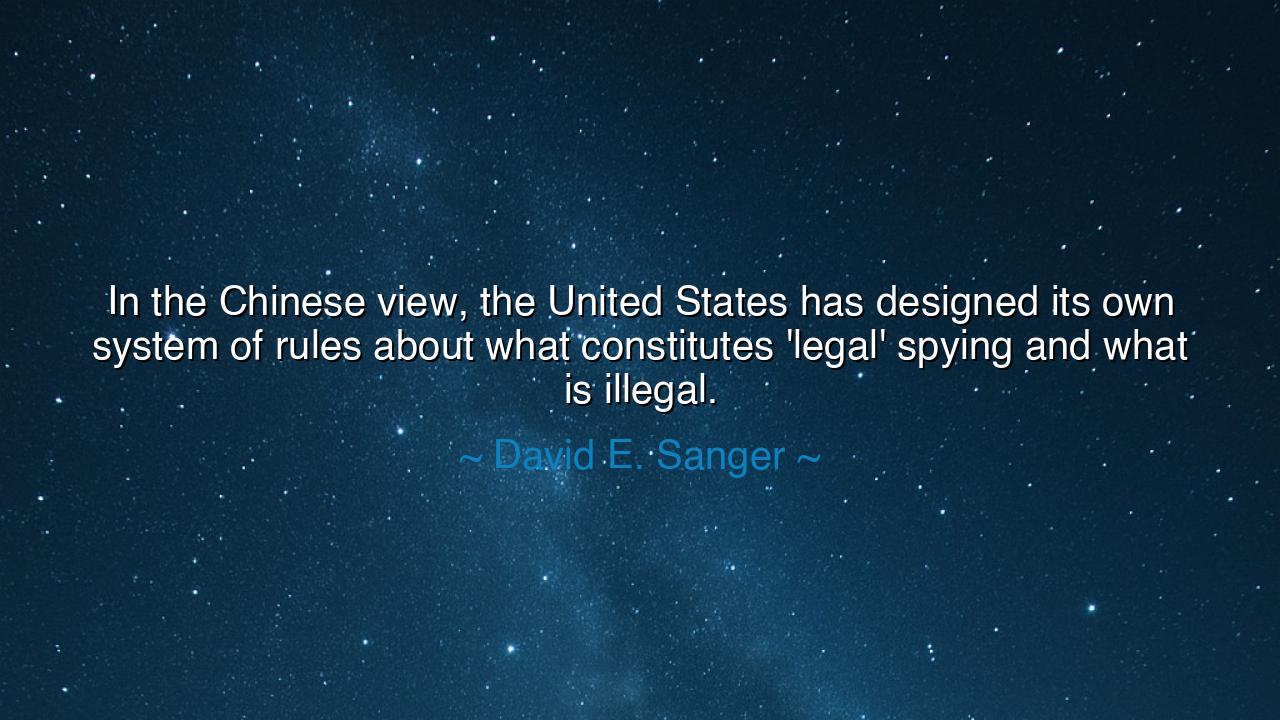
In the Chinese view, the United States has designed its own
In the Chinese view, the United States has designed its own system of rules about what constitutes 'legal' spying and what is illegal.






"In the Chinese view, the United States has designed its own system of rules about what constitutes 'legal' spying and what is illegal." Thus spoke David E. Sanger, chronicler of global power and cyber conflict, unveiling the paradox at the heart of modern espionage. His words remind us that in the shadowed world of intelligence, where nations pry into one another’s secrets, the very concept of law becomes fluid, shaped not by universal standards but by the self-interest of the mighty. For in the realm of spying, what one nation calls 'legal' is often the very act another condemns as illegal.
The origin of this wisdom lies in the age-old craft of espionage, a practice as ancient as war itself. From the spies of Sun Tzu in ancient China to the shadow agents of the Cold War, nations have always sought knowledge of their rivals. Yet, unlike the battlefield, espionage exists in a gray zone—rarely acknowledged openly, rarely bound by clear treaties. In the American view, surveillance of enemies or rivals may be deemed justified, even lawful under domestic frameworks. But in the Chinese view, this is hypocrisy: a nation that declares its own actions legitimate while condemning others for the same deeds. Thus, spying is not only a clash of secrets, but a clash of definitions.
Consider the Cold War, when the United States flew U-2 reconnaissance planes over the Soviet Union, gathering intelligence from the skies. To America, this was a necessary act of defense, a form of legal reconnaissance. But when a U-2 plane was shot down in 1960, the Soviets denounced it as an outrageous violation of sovereignty. Here we see the timeless conflict Sanger describes: the same action is framed as legal by one nation, illegal by another. The rules are not universal—they are written by power, enforced by necessity, and judged by perspective.
In our own age, the battlefield has shifted to cyberspace. American agencies have long monitored digital networks, justifying their actions under domestic laws and doctrines of national security. Yet when China engages in cyber-espionage, stealing secrets of industry or state, the United States condemns it as theft and aggression. From Beijing’s vantage point, this appears not as justice, but as double standard. Thus, the question arises: is there truly a universal rule for spying, or is each nation its own legislator in the shadows?
Sanger’s words carry an unspoken warning: when nations craft their own systems of legal justification, they invite suspicion, rivalry, and endless conflict. If each declares its actions righteous while condemning the same behavior in others, the cycle of mistrust only deepens. In such a world, law loses its meaning, becoming a banner for power rather than a shield of justice. This is the danger of espionage in the modern age—not merely the theft of secrets, but the erosion of shared standards by which nations might restrain themselves.
The lesson for us is profound: power without principle breeds only instability. If the world is to endure in an age of surveillance and cyber-conflict, it must strive for shared rules, however fragile. Nations must learn that law cannot simply be what they declare within their own borders; it must be anchored in dialogue, transparency, and mutual restraint. Without this, spying will forever remain both legal and illegal, depending on who speaks, and the trust between peoples will wither.
What practical steps must we take? Support international efforts to establish norms for cyber operations and espionage. Demand accountability from our leaders, ensuring that legal justifications are not cloaks for endless expansion of surveillance. Cultivate awareness, so that we do not blindly accept double standards but challenge them wherever they arise. And above all, remember that in every age, the measure of a nation is not only its strength, but the fairness with which it wields that strength.
So let David Sanger’s words endure as both mirror and warning: in the dark world of spying, law is too often written by the victors. But if we seek a future where trust is not utterly consumed by suspicion, we must demand more than self-serving rules—we must demand standards that all can recognize, even amidst rivalry. For without shared law, there is only power; and without justice, there can be no peace.






AAdministratorAdministrator
Welcome, honored guests. Please leave a comment, we will respond soon